Table of Contents Show
There may be products. Products are independently selected by our editors. We may earn an affiliate commission from the links with no charge to you, example: as Amazon Affiliate.
You’ll expand your perspective through these historian-recommended transformative works: “The Psychology of Money” explores timeless lessons of wealth and human behavior, while “Choose Your Story” examines how personal narratives shape our reality. “Life Is Short” offers profound insights on maximizing your impact, “Transform Your Energy” reveals ancient wisdom’s modern relevance, and “Ask Powerful Questions” uncovers hidden patterns in human connection. These selections will revolutionize how you understand yourself and society’s evolution.
Key Takeaways
- Books that challenge dominant historical narratives and incorporate diverse voices provide transformative perspectives on established historical accounts.
- Historical works backed by rigorous research, primary sources, and academic scrutiny offer reliable insights that reshape understanding.
- Books examining psychological aspects of historical figures and power dynamics help readers reflect on personal values and growth.
- Historical narratives combining clear language with compelling storytelling create deeper engagement and lasting impact on readers’ worldviews.
- Works analyzing long-term societal changes and their compounding effects provide valuable insights into contemporary social issues.
Choose Your Story: Silence Your Inner Critic and Rewrite Your Life
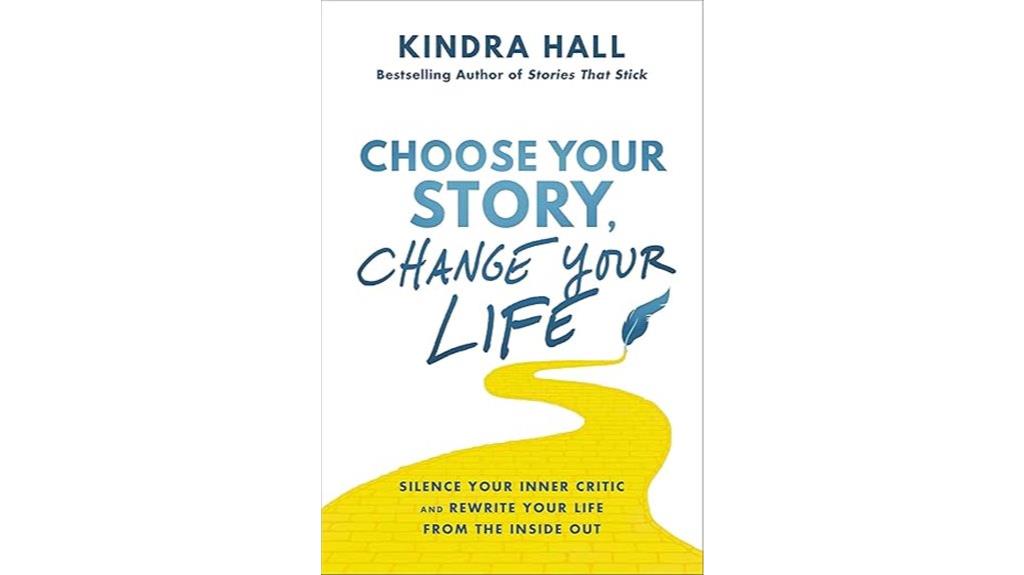
Although “Choose Your Story” isn’t technically a history book, it’s essential reading for anyone who wants to rewrite their personal history through the power of self-narrative. In this transformative guide, Kindra Hall shows you how to identify and reshape the stories that define your life.
You’ll learn a practical self-storytelling process that helps you recognize limiting beliefs, analyze your internal dialogue, and craft new narratives for personal growth. The book’s two-part structure guides you through understanding story’s power and implementing change. Whether you’re struggling with career, health, finances, or relationships, you’ll find practical exercises and relatable anecdotes to help you break free from negative thought patterns.
Best For: Individuals seeking to overcome negative self-talk, break free from limiting beliefs, and create positive change through the power of personal storytelling and narrative transformation.
Pros:
- Clear, practical methodology for identifying and rewriting self-limiting stories
- Engaging writing style with relatable anecdotes and real-life examples
- Versatile application across multiple life areas (career, relationships, health, finances)
Cons:
- Audio version may not deliver optimal listening experience
- May require repeated reading and practice to fully implement concepts
- Some readers might find the storytelling approach too indirect compared to traditional self-help methods
The Psychology of Money: Timeless lessons on wealth, greed, and happiness
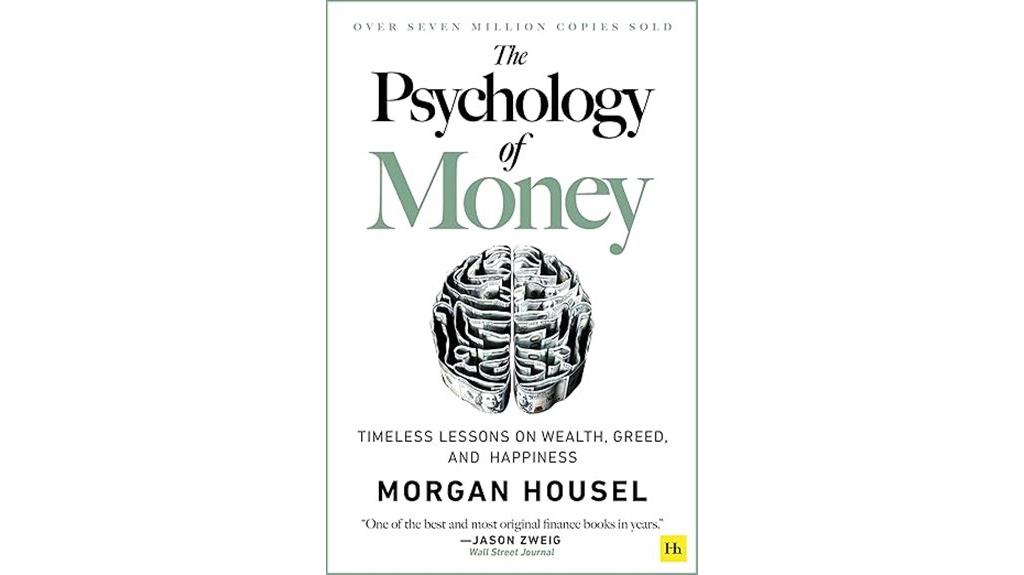
Morgan Housel’s “The Psychology of Money” stands as an essential guide for readers seeking to understand the complex relationship between human behavior and financial success. You’ll discover how your personal experiences shape your financial decisions, often in ways you don’t realize. Through compelling examples, like Warren Buffett’s wealth accumulation after age 65, the book illustrates the power of compounding and patience. Housel warns against the dangers of greed while emphasizing that true wealth isn’t about accumulating money—it’s about gaining freedom and control over your time. His practical insights will help you develop a healthier relationship with money through disciplined saving and long-term thinking.
Best For: Anyone seeking to understand the psychological aspects of money management and develop better financial habits, from beginners to experienced investors.
Pros:
- Offers practical insights through engaging storytelling and real-world examples
- Emphasizes long-term thinking and the power of compound interest
- Presents complex financial concepts in an accessible, easy-to-understand manner
Cons:
- May lack specific investment strategies for those seeking detailed technical advice
- Some concepts and examples are repeated throughout the book
- Limited focus on practical implementation steps for financial planning
Transform Your Energy – Nichiren Buddhism 3.0
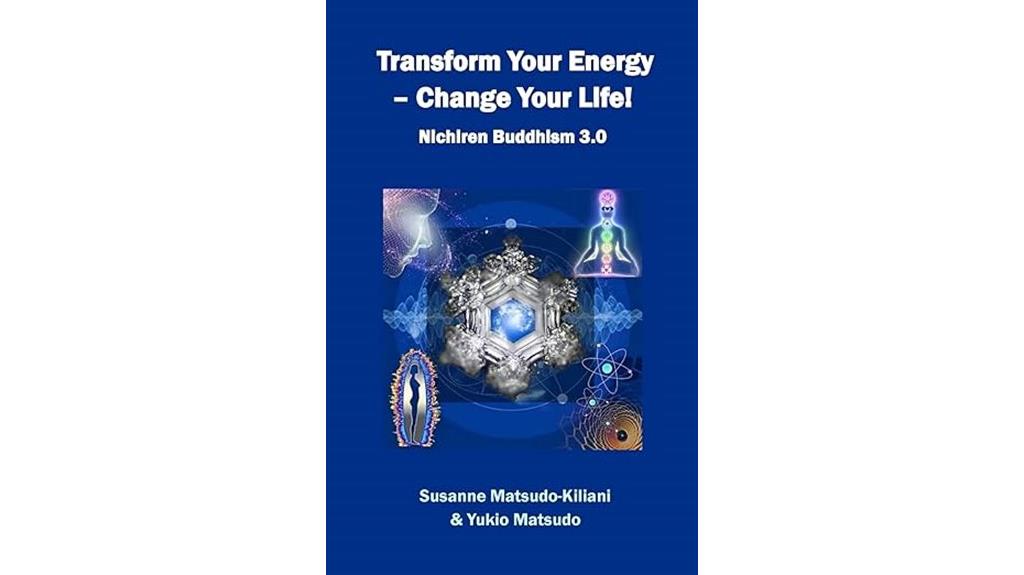
The groundbreaking book “Transform Your Energy – Change Your Life!” bridges the gap between spirituality and science for readers seeking a deeper understanding of Nichiren Buddhism.
Through scientific research and quantum physics, authors Yukio and Susan Matsudo demonstrate how chanting Nam Myoho Renge Kyo affects your energetic frequencies and chakras. You’ll discover tangible evidence of the practice’s impact on your body’s energy centers, supported by practitioners of Reiki and Pranic Healing. Moving beyond traditional religious dogma, this revolutionary approach offers you evidence-based explanations of spiritual practices. Whether you’re new to Buddhism or an experienced practitioner, you’ll gain fresh insights into the transformative power of daimoku.
Best For: Spiritual seekers and practitioners of Nichiren Buddhism who want a scientific understanding of how chanting affects energy and consciousness.
Pros:
- Bridges spiritual practice with scientific evidence through quantum physics research
- Provides concrete explanations of how chanting affects chakras and energy centers
- Makes complex Buddhist concepts accessible to modern readers
Cons:
- May challenge traditional Buddhist practitioners’ beliefs and perspectives
- Some scientific concepts might be difficult for non-technical readers to grasp
- Focus on energy and quantum physics might not appeal to those seeking purely spiritual guidance
Life Is Short: Brief Thoughts On Making The Most Of Your Life
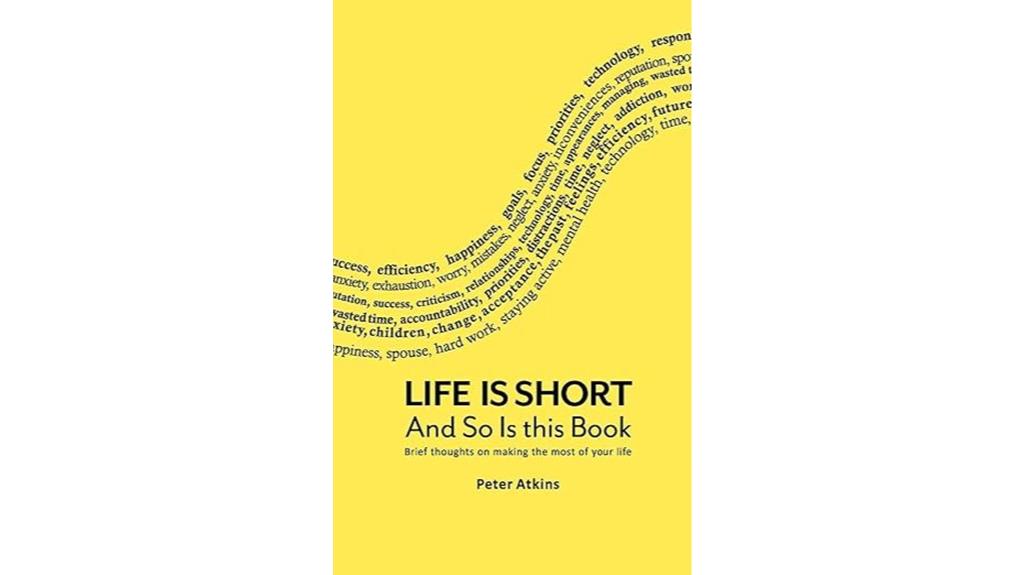
Readers seeking bite-sized wisdom will find valuable insights in “Life Is Short And So Is This Book,” which delivers practical life lessons without unnecessary fluff. The book emphasizes making every moment count through straightforward principles and personal reflections.
You’ll appreciate the author’s authentic voice and strategic use of historical quotes that add depth to the narrative. Despite complaints about small print size causing eye strain, you can complete this impactful read in about an hour.
The book’s focus on aligning your time, habits, and efforts with personal values makes it a practical guide worth revisiting. Its concise format reinforces the central message: don’t waste time – make your life count.
Best For: Busy professionals and self-improvement enthusiasts seeking quick, actionable life wisdom without having to commit to a lengthy read.
Pros:
- Can be read in about an hour, making it easily digestible
- Offers practical, straightforward advice without unnecessary filler
- Combines personal insights with historical quotes for added depth
Cons:
- Small print size causes eye strain for many readers
- May feel too basic for those seeking more in-depth analysis
- Limited scope due to its brevity
Ask Powerful Questions: Create Conversations That Matter
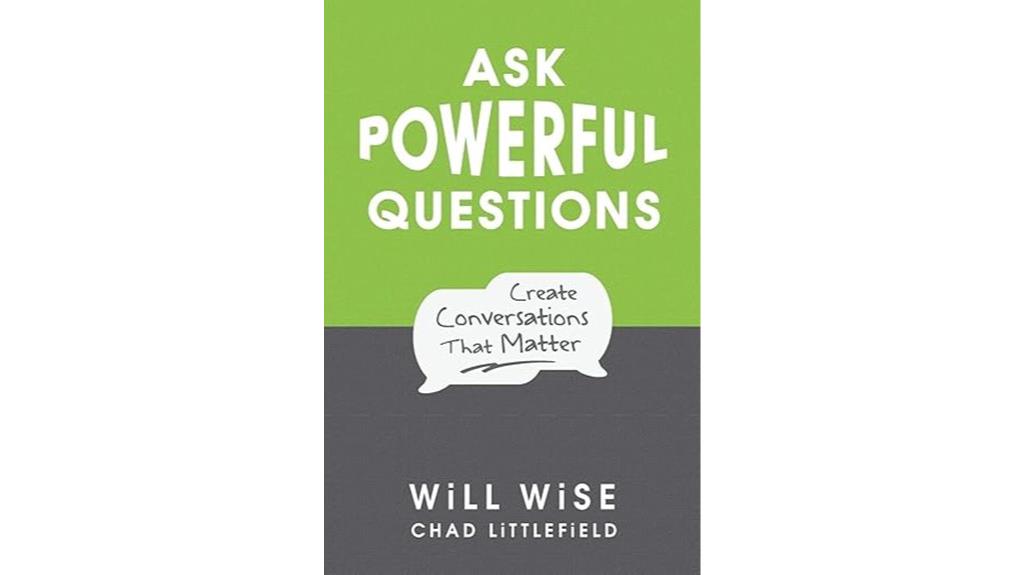
In professional settings where meaningful dialogue drives success, “Ask Powerful Questions” by Will Wise and Chad Littlefield transforms how you connect with others. Through core concepts of intention, rapport, openness, listening, and empathy, you’ll learn to craft questions that spark thoughtful responses and deeper conversations.
The authors’ personal stories and practical insights will help you engage more effectively with new people, identify common interests, and foster genuine connections. You’ll discover that adults typically ask only six to twelve questions daily, highlighting the need for increased curiosity. Whether you’re a corporate leader or facilitator, this book’s principles will enhance your communication skills and interpersonal relationships.
Best For: Professional facilitators, leaders, and coaches looking to improve their questioning skills and create more meaningful conversations in business or training environments.
Pros:
- Provides practical, actionable strategies for crafting effective questions
- Includes real-world examples and personal stories that illustrate concepts
- Applicable across various professional contexts, from corporate leadership to training
Cons:
- Introduction section could be more concise
- May feel basic for those already skilled in communication
- Limited focus on personal/social applications outside professional settings
Factors to Consider When Choosing History Books That Will Change Your Perspective on Life
When you’re selecting history books that can transform your worldview, you’ll want to evaluate their potential for personal growth while ensuring they maintain rigorous historical accuracy and engaging writing style. The most impactful history books often reveal significant cultural influences and challenge conventional wisdom through well-documented research. Look for works that present multiple historical perspectives, as they’ll help you understand complex events from various angles and broaden your understanding of human experiences throughout time.
Personal Growth Potential
History books can transform your worldview and personal growth journey if you select them thoughtfully. Look for titles that investigate psychological aspects of historical figures and events, as they’ll help you understand human behavior patterns that remain relevant today. You’ll benefit most from books that examine long-term societal changes and their compounding effects, offering insights into how small decisions shape major outcomes.
Choose works that explore how greed and power dynamics influenced historical events, as these narratives can reshape your understanding of personal values and contentment. The most impactful history books often bridge the gap between factual evidence and human experience, combining rigorous research with compelling storytelling. Focus on concise historical accounts that distill complex events into clear lessons you can apply to your own life’s challenges.
Historical Accuracy and Research
Building on your journey of personal growth through historical study, accurate research becomes the foundation for meaningful insights. You’ll want to look for books that draw from diverse primary sources, archaeological evidence, and peer-reviewed research to support their claims. Check if the author incorporates multiple perspectives and acknowledges potential biases in their narrative.
Pay attention to the historian’s credentials and institutional affiliations, as works from respected scholars typically undergo rigorous academic scrutiny. The best historical accounts will help you understand not just what happened, but why it happened by examining the social, political, and cultural context of events. When authors demonstrate thorough research methodology and provide detailed source documentation, you’re more likely to gain reliable insights that can reshape your understanding of the past.
Writing Style and Engagement
How a historical narrative unfolds can profoundly shape your engagement with its lessons. When selecting transformative history books, look for writing styles that draw you in through vivid imagery and relatable anecdotes. The best authors combine clear, accessible language with compelling storytelling to help you grasp complex historical concepts effortlessly.
You’ll find the most impactful books often feature a conversational tone that encourages personal reflection, helping you connect your own experiences with historical events. Watch for works that incorporate the author’s thoughtful reflections while maintaining scholarly rigor. Well-structured books with clear thematic divisions will help you absorb and retain essential information. When these elements come together, you’ll discover history books that don’t just inform but genuinely transform your perspective on the past and present.
Cultural Impact Assessment
When choosing history books that can reshape your worldview, evaluating their cultural impact becomes essential. Look for works that challenge traditional narratives and incorporate diverse voices, as they’ll help you understand historical events from multiple perspectives. Pay attention to how the books address marginalized communities and their stories, which often reveal overlooked aspects of shared history.
Consider how the historical narratives connect to contemporary issues you care about. The best history books don’t just recite facts—they’ll help you understand current social movements and ongoing struggles for justice. You’ll want to examine how the author’s interpretation might influence your own sense of identity and belonging. Notice whether the book encourages critical thinking about established historical accounts and prompts you to question long-held assumptions about the past.
Different Historical Perspectives
To truly expand your worldview through historical reading, you’ll need to seek out books that present multiple angles on past events. Focus on works that amplify voices from marginalized communities, as they’ll offer insights often missing from traditional narratives. You’ll gain deeper understanding by exploring texts that examine colonialism’s lasting effects on modern societies and cultural identities.
Consider biographies of diverse historical figures whose personal journeys intersect with major events, providing relatable lessons and human context. Don’t overlook books about economic history that reveal how trade and financial systems have shaped societies over time. Additionally, works analyzing technology’s historical role can transform your perspective on progress and social change. These varied viewpoints will help you piece together a more complete picture of how past events continue to influence our world.
Time Investment Required
Choosing perspective-altering history books requires careful consideration of your available time commitment. Most history books demand between 5 to 15 hours of reading time, so you’ll need to evaluate your schedule realistically. If you’re pressed for time, look for concise volumes under 200 pages that still deliver powerful insights.
You’ll get more value from your reading when you can digest the content gradually rather than rushing through complex historical narratives. Consider books that you can break into manageable segments, allowing time for reflection and deeper understanding. Select texts that match your reading pace and encourage active engagement through discussion or note-taking. This approach helps you process challenging concepts and guarantees the book’s perspective-changing message resonates long after you’ve finished reading.
Conclusion
Just as a skilled gardener selects seeds that’ll yield the most bountiful harvest, you’re now equipped to choose history books that’ll nurture your intellectual growth. Each book is a doorway to new perspectives, waiting to transform your understanding like water shapes stone over time. Let these carefully curated recommendations be your compass as you navigate through the vast landscape of historical knowledge.









